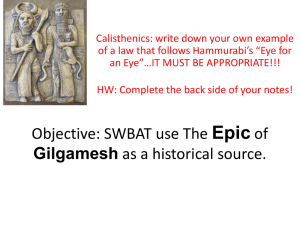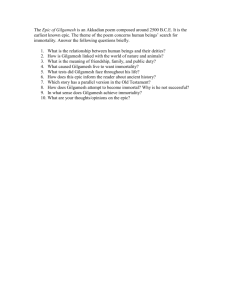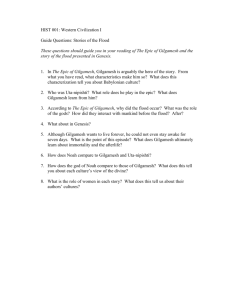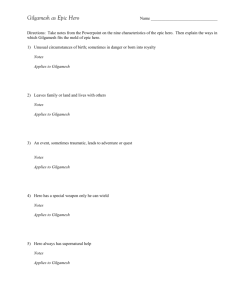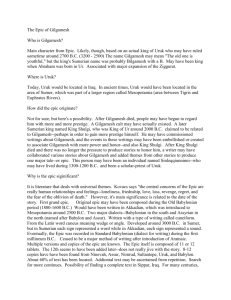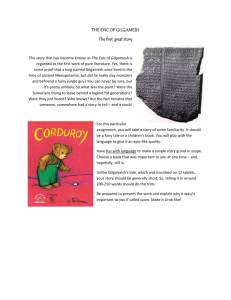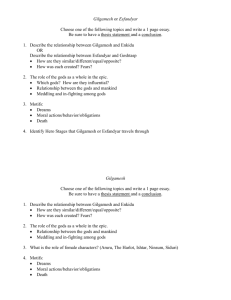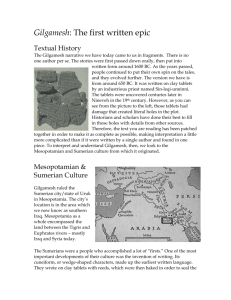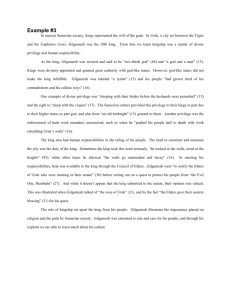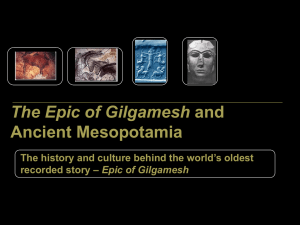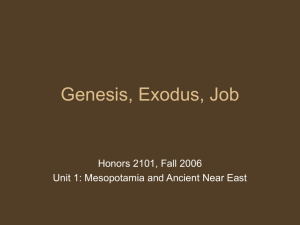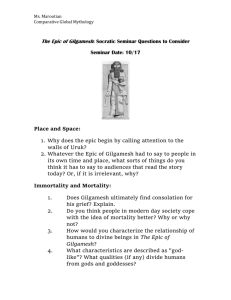Gilgamesh - Marblehead High School
advertisement
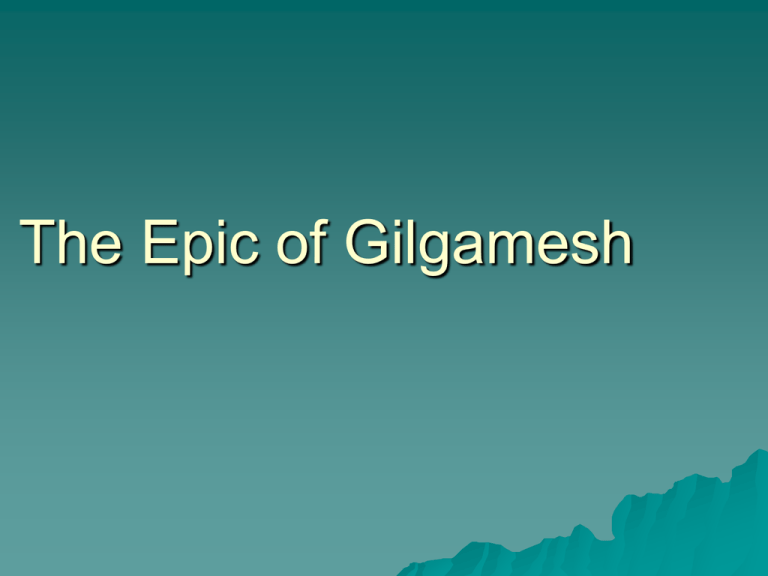
The Epic of Gilgamesh ..so what is an epic? A long narrative poem about a hero and his companions It is set in the “ideal” past, a past imagined as greater than the present The hero often has superhuman divine traits The style is elevated to the greatness of the deeds The poem is oral The epic is divided into 2 species The primary epic is a stately narrative about nobility and recited to nobility. It is spoken by a bard who speaks impersonally as the voice of the community The Iliad, the Odyssey, Beowulf ..(cont) The poet of the secondary epic has more individuality Virgil’s Aeneid Milton’s Paradise Lost Ed.Barnet, Berman, Burto, “The Dictionary of Literary Terms. Boston: Little Brown and company, 1960 Elements of an Epic (you will need to know this for the rest of your life) Journey of a hero Battles/monsters Blazon Pageantry Oratory/rhetoric cataloging Honor/loyalty Destiny Assembly scenes Perseverance Common sense Tragic waste Repetition Symbolism Long involved sentences Parallelisms Hyperbole Litotes Sung by bards to illiterates Heroic leaders on both sides An epic simile An extended comparison A subject is compared to something that is presented in such detail that the subject is sometimes lost Background Gilgamesh was written on 12 or so tablets hundreds of years before found Gilgamesh would have been known in 2000 bce. Found in the Hittite imperial capital at Boghazkoy in Anatolia, written in Semetic Akkadain Sumerians were the first literate inhabitants of Mesopotamia Gilgamesh influenced Rome/Europe The Sumerians did not unify the material into one single narrative The epic was lost and rediscovered in 1839 by 2 Englishmen in Ninevah, the once capital of ancient Assyrian empire First published in 2 volumes in 1884-1891 by Paul Haupt Do we have all the poems? 5 poems relating to Gilgamesh survived Of these 2 are used and are combined with later material in this version of the epic …but wait there’s more It’s an adventure story 2 men want fame and fun Alone, but armed, 2 friends will take on the scary forest and its guardian in a not-so-ordinary world Good vs evil Friends Not so happy ending like fairy tales gods and all their complications Anu father of gods Ishtar goddess of love and war(should sound familiar) Ea goddess of wisdpm Enlil god of storm and wind Shamash, kindly, just sungod Utu Sumerian underworld Kur mountain and foreign land Why is the Gilgamesh so important? …because it dates back to 2000 bce. It is older than the Bible and the Homeric Epics by at least a millennium and a half Facts 5 poems relate to the historical ruler of Ur: Gilgamesh A King Gilgamesh lived and reigned in the first half of 3000 bce Gilgamesh is 5th in line from the first dynasty of Uruk (after the great flood) He reigned 126 years (his son probably reigned 30 years) First tragic hero in oral tradition Sumerians First literate inhabitants of Mesopotamia They were wealthy so their land was tempting to the wild Semitic tribes of Arabia Conquerors from the North and East arrived around 4000bce They were equal in influence on their neighbors as Rome was to Europe Fiction: Gilgamesh the king Hero 2 parts god one part man His mother was a goddess, but an obscure one Father: lillu, a fool or demon of vampire kind He is superior to all men No one compares to him in love or war We meet him in his mature manhood when he is wearing out his subjects so they pray to the gods for help Enkidu He is the foil to Gilgamesh: the natural man He loses his innocence He never looks back…until his deathbed He is taken to Uruk..the city..and is lost in it Episodes 1.Meeting of friends 2.Forest journey 3.Flouting of fickle goddess 4.Death of companion 5.Search of ancestral wisdom and or immortality Main Message? • How Can I live my life when Enkindo, who I loved dearer than anyone, is now dust. • Is that all there is? • Will I be dust as well? • How should I feel about all this?
